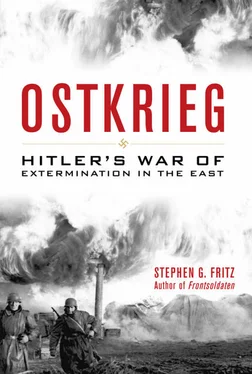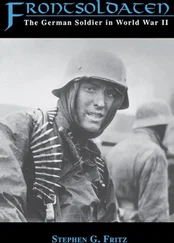Poland would be the first country to experience the full harshness of this policy, a sort of dress rehearsal for what would come later in the Soviet Union. From the beginning, Hitler had done little to hide his radical notions regarding the treatment of Poland from his top generals. A 31 July agreement between the army and the SS gave its killing units, the Einsatzgruppen , special tasks for combating anti-German activities behind the front lines, which in practice meant a license to murder. Meeting with his top commanders at the Berghof on 22 August, Hitler stressed, according to the notes of one present, the “destruction of Poland in the foreground. The aim is elimination of living forces, not the arrival at a certain line…. Have no pity. Brutal attitude. Eighty million people shall get what is their right. Their existence has to be secured. The strongest has the right. Greatest severity.” 30In part, army leaders raised no objections because they too longed for the destruction of Poland, that hated product of Versailles, and regarded Poles as racially and culturally inferior. Then, too, many likely regarded Hitler’s rhetoric as mere hyperbole.
The terror unleashed on the Polish population from the first days of the invasion left no doubt, however, that Hitler’s intentions matched his venomous words. Even as local militias composed of ethnic Germans ( Volksdeutsche ) began vigilante actions against Poles who had committed outrages against the German minority, Heydrich’s units swept into action, armed with lists of perhaps thirty thousand people to be arrested or executed. On 9 September, Franz Halder confided to Major Helmuth Groscurth the chilling news that “it was the intention of the Führer and Goering to destroy and exterminate the Polish people.” Apart from a few mild and scattered protests, however, the army leadership accommodated itself to the new reality. Rather than object in principle to this planned, wholesale murder, Brauchitsch, the army commander in chief, blandly informed his subordinates that the Einsatzgruppen had received orders from Hitler to carry out “certain ethnic tasks” that “lay outside the responsibility” of the army. Indeed, despite occasional mild protests about “excesses” committed by the Einsatzgruppen, most army commanders welcomed them as protection against presumed security threats. Although this campaign of ethnic cleansing had clearly been authorized by Hitler, it was Himmler and Heydrich, the ambitious leaders of the SS, as well as party radicals such as Hans Frank, Arthur Greiser, and Albert Forster, who grabbed the opportunity to expand their power. Hitler now made it clear that a “harsh racial struggle” would be carried out in Poland, the essence of which, as Groscurth succinctly noted, was to “exterminate.” Within days of the outbreak of war, the initiative had passed to Nazi radicals who now sought, in the words of Hans Mommsen, the “realization of Utopia.” 31
Although Hitler’s fixation on Lebensraum and intention to promote a “harsh racial struggle” in Poland had set the general direction of Nazi policy, surprisingly little practical consideration had been given to how to implement a comprehensive racial policy or to how best to “Germanize” this new Lebensraum. Such discussions began only in early September, with the resulting plans largely a consequence of two factors. The first was Hitler’s characteristic method of ruling, in which he would set broad goals or the direction of policy and then allow his subordinates to compete among each other by submitting proposals for turning policy into reality, a process that quickly produced a manic dynamism as eager Nazis sought to prove themselves and gain a step up the career ladder. Moreover, these schemes tended to be highly ambitious, radical projects since no one was going to be punished for being too ruthless. The second key factor involved ongoing discussions with Soviet officials on a final delimitation of the spheres of interest in the Baltic region agreed on in the Nazi-Soviet Pact. 32
As a result of the interplay of these two factors, by the end of September 1939 the Nazis had formulated a stunningly ambitious demographic scheme of racial reordering that involved millions of people. Though improvised at the time, these policies were fully consistent with Hitler’s underlying ideological assumptions of the need to secure living space, life as a Darwinian struggle, the unequal racial value of ethnic populations, and a determination to solve the rapidly expanding Jewish problem. While, ultimately, the last of these obsessions came to dominate Nazi policy, in the autumn of 1939 securing and Germanizing the newly won living space clearly took precedence. Moreover, an agreement on 28 September between German and Soviet officials on a revision of their respective spheres of influence in the Baltic meant that Lithuania would now fall into the Soviet orbit. In exchange, however, the Germans secured the right to repatriate Volksdeutsche from the Soviet sphere. Nazi leaders now envisioned a comprehensive racial restructuring of Eastern Europe in which Germans would be consolidated in the newly annexed territories of formerly western Poland, Poles would be concentrated in a vassal state to the east, and Jews would be shoved to the outer reaches of the German domain. In order to make room for the resettlement of hundreds of thousands of ethnic Germans in West Prussia and the Wartheland, both former Polish provinces, the Nazis needed to clear the areas of their Polish and Jewish inhabitants. What had begun at the beginning of September as the intended liquidation of the Polish intelligentsia had now grown into a plan for the dispossession of millions of Poles. As Goebbels noted in his diary on 10 October, “The Führer’s verdict on the Poles is devastating. More like animals than human beings.” 33
This question of living space was also inextricably connected with the search for a resolution to the Jewish question. Until 1939, the preferred Nazi solution for German Jews entailed emigration and occasional expulsion. The outbreak of war, however, changed the situation in fundamentally radical ways. Not only did the already diminishing avenues for emigration constrict even further, but the Nazis also now found themselves faced with an even greater problem. The spectacular military triumph in Poland left them with perhaps 2 million Jews under their control, a number that promised to overwhelm the already feeble strategy of emigration. Moreover, many Germans, especially young soldiers, for the first time encountered the seemingly alien eastern Jews, the Ostjuden , who had for years been the target of scurrilous Nazi propaganda. The reality, and staggering numbers, of these strange people seemed to confirm the Nazi message that they were the biological and spiritual antithesis of German culture. Finally, and of key significance, the outbreak of war both fueled party radicals and freed the Nazi leaders from various restraints in their handling of the Jewish problem. Hitler had long defined international Jewry as the enemy of Germany, and, now that the nation found itself in a war allegedly provoked by that same Jewish conspiracy, harsh measures against Jews under German control seemed necessary. Poland thus became, as Christopher Browning has put it, a “ ‘laboratory’ for Nazi experiments in racial imperialism, an area where [the Nazis] tried to turn into reality ideological slogans such as Lebensraum.” 34This process eventually involved much trial and error, and growing frustrations, before the Nazis settled on the Final Solution.
Even as the deportations of Poles and the resettlement of Volksdeutsche began in mid-October a host of problems ensued: Poles targeted for deportation were not provided the most basic necessities of life; German officials had not anticipated likely Polish resistance; Himmler’s insistence on screening Poles for possible Germanization raised difficulties; and the whole operation threatened a serious disruption of economic life in the occupied territories. The latter objection, along with transportation shortages occasioned by the growing demands of army authorities for rolling stock to prepare the campaign in the west, resulted in a curbing of, if not a halt to, the deportations. Typical of the improvised nature of this demographic scheme, little thought had been given to what to do with the Jewish population of the affected areas. Nazi officials initially thought in terms of expelling them over the demarcation line between German- and Soviet-occupied Poland, then, after that idea failed, decided to place them in ghettos as a temporary measure until a final decision was made. 35
Читать дальше












